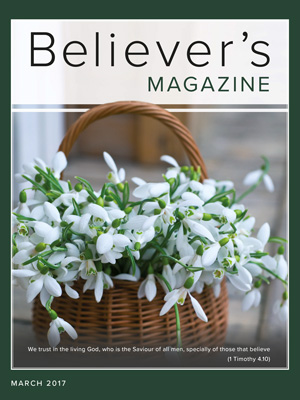In the two previous articles on the subject of The Significance of Pentecost, we considered the first of four important features of that momentous day recorded in Acts chapter 2. As well as it being The Fulfilment of a Divine Promise, it was also:
The Commencement of a New Era
This present period of human history, that we often call ‘the Church Age’, is characterised by the residence of the Spirit of God in the Church on earth, and by the presence of Christ sitting at the right hand of God in Heaven (see Acts 2.30 and 34). The Church is now “an habitation of God through the Spirit” (Eph 2.22). The whole era is peculiar in this respect, that it is characterised by the presence of the Holy Spirit on earth. This did not apply in Old Testament times. Then, the Spirit wrought from Heaven upon men on earth: His visits were temporary. Now, the Spirit of God has changed His headquarters, and He works on earth, in the Church, and His stay will be for as long as the Church is on earth. The Lord Jesus, in the ‘Upper Room Discourse’ recorded in John chapters 13 to 16, foreshadows these times. The mission of the Holy Spirit is, in principle, the same as that of Abraham’s servant recorded in Genesis 24, namely, to call out a bride for His Son. That bride was ‘called out’ from her former surroundings, and led through a wilderness to her future place of residence; the Father’s house. Moreover, the forms and ceremonies, and times and seasons, of a previous economy are now redundant and out of date. The intelligent Christian does not observe these, “for we … worship God in the spirit” (Phil 3.3).
However, it must be borne in mind that the operation of the Spirit in the believer, and in the saints when gathered together, should not be associated with mere mental ‘excitement’. Many times the believer is exhorted to “be sober”, and a careful perusal of 1 Corinthians 14 will reveal that, while the apostle has much to say about the “understanding”, he has nothing whatever to say in that chapter about being “led by the Spirit”. Not that in Church exercises the leading of the Spirit should be absent, but it should merely be the action in the Church of what is the normal characteristic of the believer’s life. The presence of the Spirit of God in the Church does not give liberty to act just as one will under the pressure of mental excitement. It will observe the injunctions and prohibitions of Scripture, such as “Let your women keep silence in the churches” (1 Cor 14.34) which, in modern times, has been notably spurned and disobeyed. 2 Corinthians 3.17 states that “where the Spirit of the Lord is, there is liberty”, but this does not imply that where the Spirit of God is there is liberty of unrestrained action. The context forbids such an interpretation: it has to do with freedom from the Mosaic law. And while it is freely admitted that we are to “Quench not the Spirit”, we must not forget that we are to “Prove [test] all things”, which is written in the same context (1 Thess 5.19-21) and, should anything take place in the Church which has the appearance of disconformity with what is written, we must “abstain” from it (v 22). The writer of this paper supposes that he is crystal clear as to the rights of the Holy Spirit in the gathered Church, nor would he wish in the slightest to underestimate their importance. But he fears that in some quarters where these ‘rights’ have been ignored, or things have been superimposed upon them, the result has been that very thing envisaged by Paul, and people have said “ye are mad” (1 Cor 14.23), thus bringing dishonour on the name of the Lord and contempt for His people.
(To be continued …)









